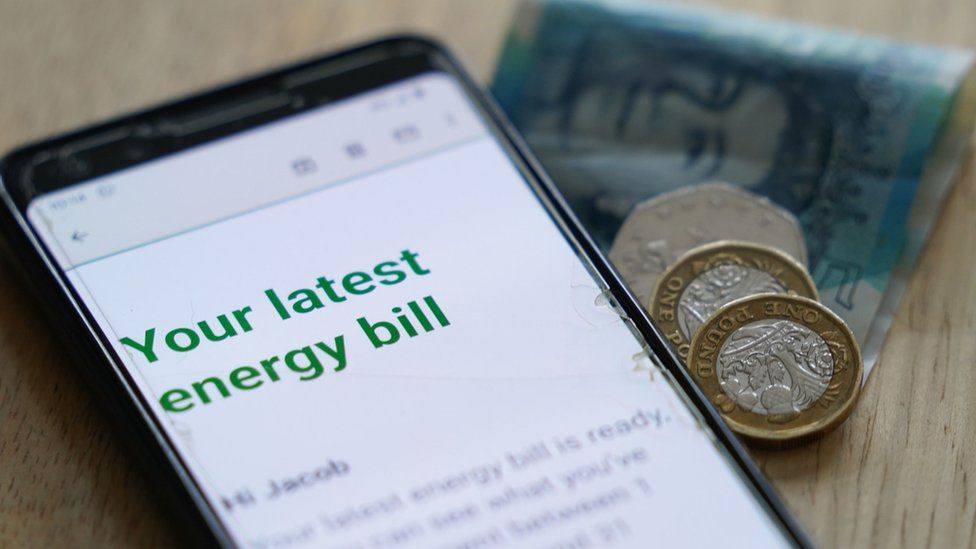
A scheme to cap all household energy bills for two years will be cut from April, the new chancellor has said.
Jeremy Hunt said the support – which limits a typical household bill to £2,500 – would be reviewed so it cost “significantly less than planned”.
He said the most vulnerable would continue to be protected from soaring wholesale energy prices.
The move sparked concern among consumer groups who warned households would be plunged into uncertainty.
“Everyone knows why decisions have been made at breakneck speed, but there are questions that need to be answered, and answered quickly,” said National Energy Action boss Adam Scorer.
“Who will still get support? Will it include vulnerable households not on welfare benefits? Will that support be deeper for those in greatest need?”
Mr Hunt is trying to save money after the government’s mini-budget left a big projected hole in the public finances. Its plan for large tax cuts sparked turmoil on financial markets over how the plans would be funded.
“Beyond [April], the Prime Minister and I have agreed it would not be responsible to continue exposing public finances to unlimited volatility in international gas prices,” the chancellor said.
“The objective is to design a new approach that will cost the taxpayer significantly less than planned whilst ensuring enough support for those in need,” he said.
Under the Energy Price Guarantee, announced last month, Ms Truss’s government capped all household energy bills for two years from 1 October in a bid to prevent millions facing hardship this winter.
Before this guarantee was introduced, the energy price cap – the highest amount suppliers are allowed to charge households for every unit of energy they use – had been due to rise to £3,549 for a typical household from October.

How is the rising cost of living affecting you? Get in touch.
- Email haveyoursay@bbc.co.uk
- WhatsApp: +44 7756 165803
- Tweet: @BBC_HaveYourSay
- Please read our terms & conditions and privacy policy

Consumer rights campaigner Martin Lewis said that while the support for intervention had been desperately needed, a “universal energy price guarantee was always expensive and poorly targeted”.
But he added: “The post-April support will still need to reach a decent way up the net and support middle earners, energy rates are still huge.”
Ms Truss’s plan – thought to cost up to £150bn – was to be funded through government borrowing after the prime minister rejected calls to extend a windfall tax on oil and gas firms.
However, former chancellor Kwasi Kwarteng followed it with plans to cut taxes by some £45bn.
Concerns about rising borrowing sparked turmoil on financial markets which spilled over into the mortgage market, where interest rates on loans have surged to 14-year highs.

On Monday, Mr Hunt promised to review the energy support while also reversing £32bn worth of the planned tax cuts. The new chancellor said he was doing “what is necessary for economic stability”.
He added that the Energy Price Guarantee had been “the biggest single expense” of Mr Kwarteng’s growth plan.
When it was announced, many had criticised the scheme for not being targeted enough, arguing the support should have been means tested.
The Institute for Fiscal Studies think tank, which had described the package as “clearly not sustainable in the long-term”, welcomed Mr Hunt’s decision.
“While large-scale untargeted support for households this winter was perhaps unavoidable we need to do everything possible to put in place a better designed, better targeted and less expensive scheme next year,” said IFS director Paul Johnson.
Call for clarity
But the Centre for Ageing Better, a charity, said many older people faced an anxious wait to find out how much help they would get.
Boss Carole Easton said: “The previous two-year promise provided a level of security for people in uncertain times.
“It is vital that the government gives plenty of advance notice with clear messaging as to who will be eligible for targeted support in April.”
Under Ms Truss’s scheme, businesses are protected for six months from soaring energy prices, with those struggling most set to continue receiving help pending a review.
Mr Hunt suggested the targeted approach would continue, but the Federation of Small Businesses (FSB) called for clarity.
“The review to come on business and consumer energy support after six months must avoid a cliff-edge for small firms that remain impacted and vulnerable,” said the FSB’s national chair, Martin McTague.
-
-
22 September

-

